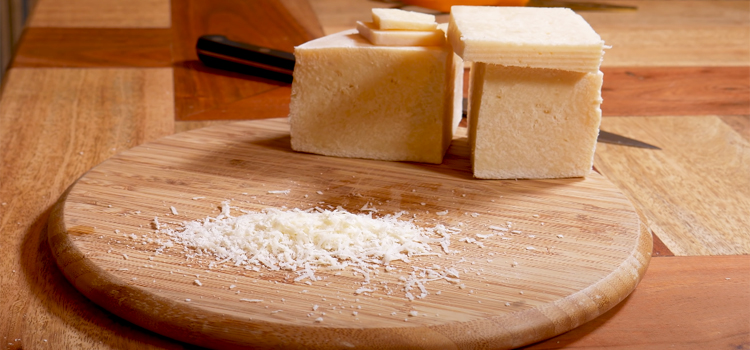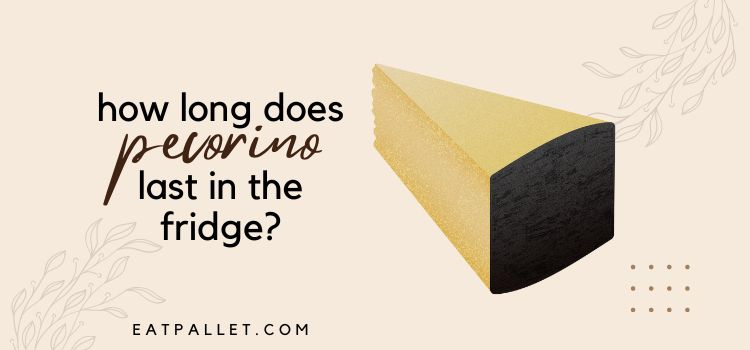Last Updated on July 15, 2024 by Shari Mason
Pecorino, a **robust Italian cheese** made from sheep’s milk, adds a special flavor to pasta dishes, salads, and pizza. Its unique taste makes meals more delightful.
While it has a delicious and distinct flavor, it is essential to understand how long Pecorino will last in the fridge before it goes bad.
Whether you are a cheese connoisseur or enjoy a good chunk of Pecorino occasionally, understanding how to store and use it properly will ensure that it remains fresh and flavorful for as long as possible.
How Long Is Pecorino Good For In The Fridge?


Pecorino cheese [1] can last up to 2-3 months in the refrigerator if stored properly in an airtight container. However, its quality and flavor may decline after a month or so.
“You have to be a romantic to invest yourself, your money, and your time in cheese.”
– Anthony Bourdain, American Chef
It is vital to regularly check for any signs of spoilage, such as mold, a strong odor, or an off taste, and discard the cheese if any of these are present.
Proper storage, including wrapping the cheese in wax paper or plastic wrap to reduce air exposure, can help prolong its shelf life.
Read:
- Can I Use Mozzarella Instead Of Parmesan For Alfredo Sauce?
- How Long Is Sliced Deli Cheese Good For?
- How To Tell If Shredded Cheese Is Bad?
Can You Freeze Pecorino?
Yes, you can freeze Pecorino cheese. Freezing can help extend its shelf life and prevent spoilage, but it can also affect the texture and flavor of the cheese.
It’s best to wrap the cheese tightly in plastic or aluminum foil and place it in an airtight container before freezing.
When ready to use, allow the cheese to thaw in the refrigerator for 24-48 hours before consuming.
It’s important to note that some of the texture and flavor changes may be irreversible, and the cheese may become crumbly and have a different taste after being frozen.
It is recommended to use frozen Pecorino cheese for cooking purposes rather than eating it as is.
How Long Can It Last At Room Temperature?
Pecorino cheese can last for up to 2 hours at room temperature. It is crucial to keep the cheese adequately stored, as exposure to air, moisture, and warm temperatures can cause it to spoil quickly.
If you are serving Pecorino cheese as part of a cheese plate or in a salad, it is recommended to keep it refrigerated until just before acting and then return it to the fridge as soon as possible.
Leaving the cheese out at room temperature for too long can affect its quality and flavor and lead to the growth of harmful bacteria.
To ensure food safety, it is always best to store Pecorino cheese in the refrigerator.
What Can You Do With Leftover Pecorino?
- Grate it: Pecorino cheese can be grated and used as a topping for pasta dishes, pizzas, salads, and soups.
- Make a sauce: Pecorino can be melted into a sauce and served over vegetables, meats, or pasta.
- Snacks: Pecorino can be enjoyed as a snack or paired with crackers, bread, or fruit.
- Baked goods: Pecorino cheese can be incorporated into baked goods such as bread, scones, and biscuits for added flavor.
- Salad dressing: Grated Pecorino cheese can be mixed into a vinaigrette dressing to add a nutty flavor to salads.
- Fondue: Pecorino cheese can be melted into a fondue [2] and served with bread, vegetables, or meats for dipping.
- Grilled cheese: Pecorino cheese can be used as a filling for a grilled cheese sandwich.
Signs That It Might Have Gone Bad


- Mold: Look for any green, blue, or black spots on the surface of the cheese, as this is a clear sign of mold growth.
- Strong odor: Pecorino cheese should have a mild, nutty, and slightly sharp scent. It may be past its prime if it has a strong, sour, or musty smell.
- Off-taste: If the cheese has a bitter, sour, or salty taste, it may have gone wrong.
- Textural changes: If the cheese has become soft, slimy, or rubbery, it is likely past its prime.
- Discoloration: If the cheese has darkened or yellowed in color, it may be a sign of spoilage.
Tips On How To Store Pecorino
- Wrap it tightly: Wrap the cheese in wax paper or plastic wrap to reduce exposure to air and prevent it from drying out.
- Store in an airtight container: Place the wrapped cheese in an airtight container or a resealable plastic bag before storing it in the refrigerator.
- Avoid the cheese drawer: The cheese drawer in the refrigerator can often be too humid, which can cause the cheese to spoil quickly. Instead, store the cheese on a shelf in the fridge.
- Please keep it away from strong-smelling foods: Pecorino cheese can absorb odors from other foods, so it’s best to store it away from strongly-scented items such as garlic or onions.
- Use within the recommended time frame: Pecorino cheese will last for up to 3-4 months in the refrigerator, but its quality and flavor may decline after 2-3 months. Use it within this time frame to ensure maximum freshness and flavor.
FAQs
u003cstrongu003eDoes Pecorino need to be refrigerated?u003c/strongu003e
Yes, Pecorino cheese should be refrigerated. A perishable dairy product is susceptible to spoilage and bacterial growth at room temperature. u003cbru003eu003cbru003eStoring Pecorino cheese in the refrigerator slows down these processes and helps to preserve its freshness, flavor, and texture.
u003cstrongu003eWhy does Pecorino smell like vomit?u003c/strongu003e
Pecorino cheese should not smell like vomit. If a Pecorino cheese has a strong, sour, or musty odor resembling vomit, it is likely that it has gone bad and should not be consumed.
Key Takeaways
Pecorino cheese can last for 2-3 months in the refrigerator when stored properly.
Keeping the cheese wrapped tightly in wax paper or plastic wrap and stored in an airtight container will help to preserve its freshness and prevent spoilage.
It is important to avoid storing Pecorino cheese near strong-smelling foods and using it within the recommended time frame to ensure that it remains fresh and safe to consume.
If the cheese has an unpleasant odor or has been stored for an extended period, it is best to discard it to avoid the risk of foodborne illness.
References:
- https://www.foodnetwork.com/fn-dish/how-to/2014/09/everything-you-need-to-know-about-pecorino-cheese
- https://www.foodandwine.com/recipes/classic-swiss-cheese-fondue
- How to Cancel a Pizza Hut Order? Quick & Easy Guide - July 26, 2024
- How Long Do I Cook a DiGiorno Pizza? Perfect Timing Tips - July 26, 2024
- What Kind of Advertising Do Restaurants Use? - July 24, 2024

